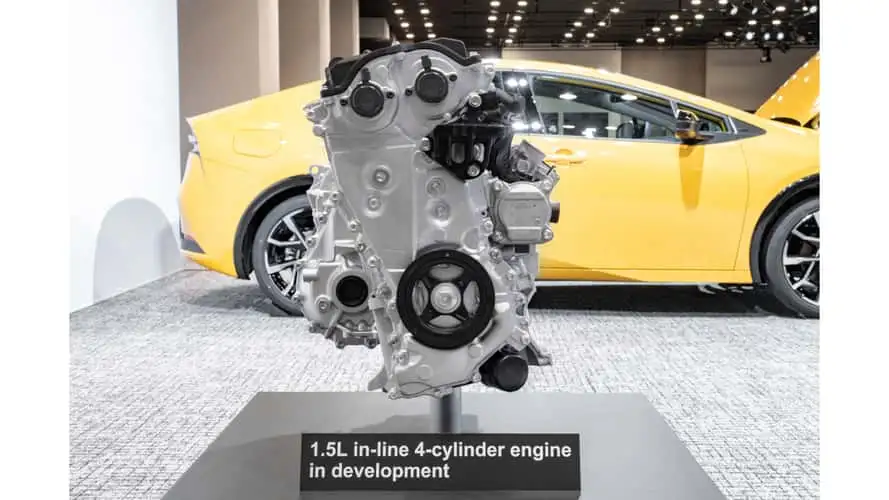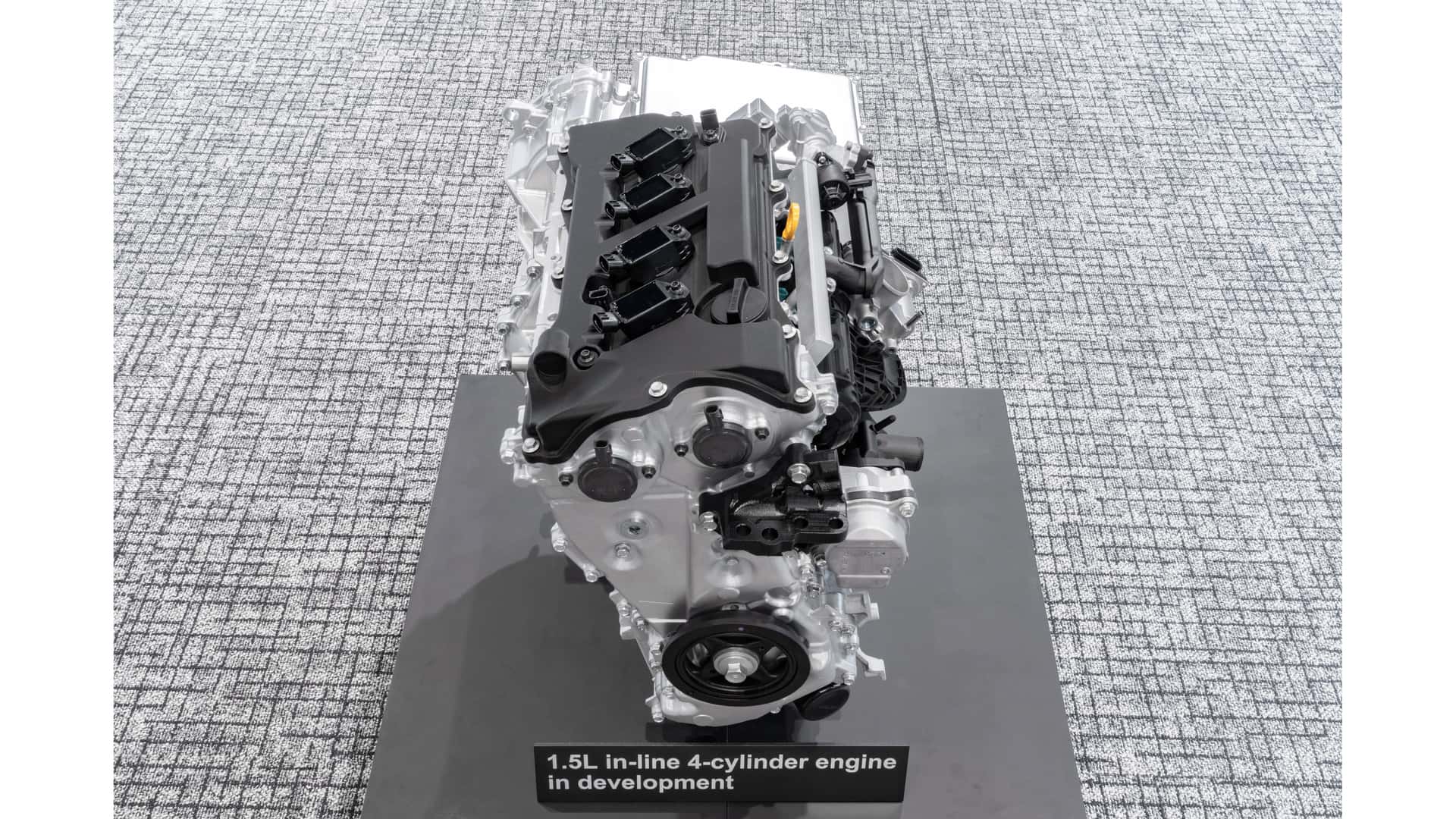
Posted on 08/13/2025 7:11:07 AM PDT by Red Badger

Toyota is adamant that the internal combustion engine still has a bright future despite the rise of electric vehicles. The world’s largest carmaker has reaffirmed its long-term commitment to ICE by partnering with fellow Japanese brands Subaru and Mazda on a new family of gas engines. Smaller and lighter four-cylinder units are touted as a “game-changer solution” by the company’s Chief Technology Officer, Hiroki Nakajima.
We now know the Japanese automotive giant plans to use the upcoming 1.5- and 2.0-liter engines in nearly every conceivable type of powertrain. Toyota Europe Vice President of Product Strategy and Marketing Andrea Carlucci told Automotive News the new hardware’s versatility is key: “We are trying to optimize the new engine for any type of application, whether it’s electric, hybrid, or hydrogen.”
While the idea of a gas engine in an electric application might sound odd, a plausible scenario exists. Toyota is likely referring to extended-range electric vehicles (EREVs), where the combustion engine doesn’t drive the wheels but instead serves solely as a generator to recharge the battery on the go. This setup allows the engine to run at optimal speeds for maximum efficiency. Examples include the BMW i3 REX, the Ramcharger, Mazda MX-30, Scout’s upcoming truck and SUV, and Nissan’s models equipped with E-Power tech.
Toyota has already announced plans to sell extended-range electric vehicles in China through its local joint venture with GAC, giving the Highlander SUV and Sienna minivan the EREV treatment. These models are expected to use a small engine that isn’t mechanically connected to the wheels. Instead, propulsion will come exclusively from electric motors, with the engine serving only to extend range without abandoning gasoline entirely.
Toyota achieved 41 percent thermal efficiency back in 2018 and could be aiming to improve that figure further. Its next-generation engines will run not only on fossil fuels, but also on biofuel, hydrogen, and synthetic fuel. Beyond full hybrids and EREVs, Toyota is also exploring long-range plug-in hybrids, with Carlucci estimating that 62 miles (100 kilometers) without sipping any gasoline represents the “tipping point.”
Confirmed engines include naturally aspirated and turbocharged 1.5-liter units, along with a larger 2.0-liter turbo. Efficiency won’t be the only focus as the latter will also have a performance version for Gazoo Racing (GR) models, delivering up to 600 horsepower in race cars.
New Toyota four-cylinder engines


Carlucci also discussed vehicle architectures:
“Everybody has taken an ICE platform and turned it into something that is electrified to some degree. So, why not conceive a platform that is EV-native and see how much we can adapt it to be used for a plug-in hybrid or a full-hybrid without sacrificing any of the new platform’s strengths?”
Of course, dedicated electric platforms are nothing new. Tesla is the obvious example, but there’s also Volkswagen Group’s MEB, Hyundai and Kia’s E-GMP, and Mercedes’ EVA, among others. Additionally, some EV-native platforms can also accommodate combustion engines, such as Stellantis’ STLA Small, Medium, Large, and Frame. Scout’s upcoming models fit this category, as will VW Group vehicles on the forthcoming Scalable Systems Platform (SSP).
Much like Toyota chairman Akio Toyoda, who has famously said EVs will never exceed a 30 percent market share, Carlucci maintains that electric cars are not the sole path to decarbonization. He argues for powertrain diversity, giving customers the freedom to choose: “We will not push EVs in markets where there is no demand.”
“Toyota seems to have found a good solution with the Prius.”
All new Camry’s and RAV4’s are hybrids.
The next question is how many kW will these gas engines produce to power the EV car (charge the battery)? Let's say we're getting 2 miles / kWh while driving 80mph down the highway. That means we're consuming 40 kWh in an hour. Will the gas generator in the car provide at least 40kW of power to keep us going indefinitely? Maybe a 4-cyl engine can do that. If not, then the car will still be very dependent on the battery for long trips, and the article says they're looking at 60 miles on battery alone.
If the engine can produce at least 40kW of power to power the motors and charge the batteries, then it'd be a practical car for most people. For local driving, the 60 mile range on battery alone would save a lot on gas (use up practically no gas for local driving while adding only a little to your power bill), while on long trip driving you don't have to stop to recharge every 200 or so miles like in a BEV.
“AKA in auto-talk: Hybrid.”
Locomotives don’t use batteries for propulsion.
These are EV’s.
“allows the engine to run at optimal speeds for maximum efficiency”
I think diesel electric locomotives, which have no batteries, have the ability to configure the windings in the generator so that at low speeds, lower voltage, higher amperage current is delivered to the traction motors.
At high speeds, where the traction motors produce a higher back-voltage, the generators need to feed them a higher voltage.
And keeping the diesel motors running in a decent efficiency range.
Basically, it’s electrical gear shifting.
“Will the gas generator in the car provide at least 40kW of power to keep us going indefinitely? Maybe a 4-cyl engine can do that.”
40 kw is 54 hp.
Two things:
41 percent thermal efficiency? That’s Something
Gazoo Racing? What wacko came up with that name??
https://en.wikipedia.org/wiki/The_Great_Gazoo
Hhmmm...we just bought a toyota hybrid ...awaiting delivery...is this similar?
Sorta, but EVs suck.
However, electric drivetrains are far superior to mechanical ones, especially atomic transmissions (guaranteed to blow up on you).
Coupled with a minimal battery size and a lightweight high output powerplant, a sexy AWD coupe or sports sedan would be a blast to drive, long lived and very trouble free.
A similar configuration would also make a decent AWD or 4X4 truck, either gas or diesel.
I think batteries have revolutionized the bicycle industry.
Walking is about 3mph, even a slow EV bike ride is 10-12mph.
Bike paths for suburban transportation are now a realistic option in/when warm climes.
And hybrids shouldn't need much battery power either, just enough to get rolling smoothly from a dead stop.
Well, “we are waiting”.
So, by adding a gasoline engine, how many more things to go wrong?
It sort-of makes sense for a vehicle that has a lot of local short trips and some longer trips. But I question the value, versus cost and weight, of electric operation for even short trips, which by definition for non-commercial use don’t normally rack up many miles.

> long lived and very trouble free.
The E part, sure. The fuel-burning part, not necessarily.
Toyota should bring back the 5.7 V8. That engine is bulletproof. Enough of the small v6 with twin turbos. Using high rpm to get torque and hp is a fool’s error.
The Ford 10 speed auto tranny is the path. Others should follow that lead.
Depends on who builds the engine. Toyota has a good reputation for longevity.
Depends on model....................
Depends on model....................
256k miles on my Subaru Legacy 2.5GT. Toyota does has a small share with Subaru/Fuji Heavy Industries.
The flat 4 turbo and AWD are legendary. Had issues in the early years with head gaskets, but reliable as the years go on. Most of the bugs have been worked out since its been in production for so long in one form or another.
Disclaimer: Opinions posted on Free Republic are those of the individual posters and do not necessarily represent the opinion of Free Republic or its management. All materials posted herein are protected by copyright law and the exemption for fair use of copyrighted works.